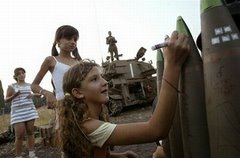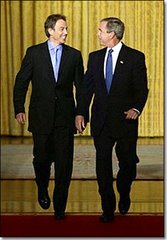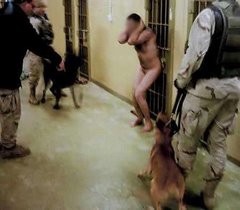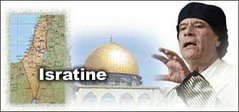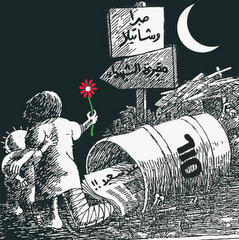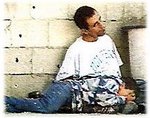 Facility 1391: Known as "Israel's Guantanamo
Facility 1391: Known as "Israel's Guantanamo The men under the black hoods all have the same question once the blindfolds and manacles are off: Where am I? A voice filtering through a narrow slit in the steel door told Sameer Jadala he was "in Honolulu", Raab Bader that he was "in a submarine" and "outside the borders of Israel", Bashar Jadala that he was "on the moon". None of them imagined it at the time, because only a handful of the political and security establishment knew such a thing existed, but they were prisoners in Israel's Guantanamo: Facility 1391.
"I was barefoot in my pyjamas when they arrested me and it was really cold," says Sameer Jadala, a Palestinian school bus driver. "When I got to that place, they told me to strip and gave me a blue uniform. Then they gave me a black sack. They told me: 'This is your sack. You need to keep it with you. Any time someone comes to your cell, you must put it on your head. Any time they deliver the food, you must put it on your head. You must never see the soldiers' faces. You do not want to know what will happen if you take it off.' Sometimes I thought I would die in that place and no one would ever know."
Facility 1391 has been airbrushed from Israeli aerial photographs and purged from modern maps. Where once a police station was marked there is now a blank space. Sometimes even the road leading to it has been erased. But Israel's secret prison, inside an army intelligence base close to the main road between Hadera and Afula in northern Israel, is real enough. For 20 years or more it has been housed in a large, imposing, single-storey building designed by a British engineer, Sir Charles Taggart, during the 1930s as one of a series of garrison forts designed to contain growing unrest in Palestine. Today, the thick concrete walls and iron gates are themselves protected by a double fence overseen by watchtowers and patrolled by attack dogs.
The prison has held Lebanese abducted by the Israeli army as hostages, Iraqi defectors and a Syrian intelligence officer who tried to defect but was accused of spying and chose to remain in another prison rather than return home and face a firing squad. More recently, scores of Palestinians were incarcerated in 1391 for interrogation, which finally led to the almost accidental disclosure of a prison the state decreed did not exist.
Those who have been through its gates know it is no illusion. One former inmate has filed a lawsuit alleging that he was raped twice - once by a man and once with a stick - during questioning. But most of those who emerge say the real torture is the psychological impact of solitary confinement in filthy, blackened cells so poorly lit that inmates can barely see their own hands, and with no idea where they are or, in many cases, why they are there.
"Our main conclusion is that it exists to make torture possible - a particular kind of torture that creates progressive states of dread, dependency, debility," says Manal Hazzan, a human rights lawyer who helped expose the prison's existence. "The law gives the army enough authority already to hide prisoners, so why do they need a secret facility?"
Unlike any other Israeli prison, the International Red Cross, lawyers and members of the Israeli parliament have been refused access. One leftwing MP, Zahava Gal-On, describes Facility 1391 as "one of the signs of totalitarian regimes and of the third world". The Israeli government declines to discuss the secret prison other than to issue a standard response: "Facility 1391 is situated on a secret military base. The base is used by the security services for various classified activities and thus its location is kept confidential."
But it is not just human rights lawyers and leftwing MPs who have a problem. Ami Ayalon is a former head of Israel's intelligence service, the Shin Bet. He was told about 1391 but says he refused to have anything to do with it. "I knew there was a facility not under the responsibility of the Shin Bet, but under the responsibility of the military. I didn't think then, and I don't think today, that such an institution should exist in a democracy," he says.
Sameer Jadala was detained at his home in Nablus last year at 3 o'clock on a December morning. For three days, the 33-year-old Palestinian was moved from one prison cell to another. On the fourth day, he was blindfolded, handcuffed and his feet manacled. Blacked-out glasses were pushed over his eyes as he was forced into the back of a car and on to the floor. Then he was covered with a blanket.
Jadala estimates that he was driven for about an hour. "We were taken out one by one. The only reason I knew there were two other prisoners in the car was the sound of the chains," he says. "I was blindfolded right up to the time they took me to the cell. There was a small slit in the door. It was not even wide enough to push a cigarette through. A voice said, 'Take the blindfold off but any time I come you must put it on and put your hands on the wall.'"
Raab Bader, a 38-year-old accountant and father of two, was also in the cells, although the two men had no contact. He too had been detained in Nablus, though he was convinced he had nothing to hide. "I was held like a blind mole, except for the prolonged hours that an [intelligence] agent interrogated me," he says.
Bader was variously told that he was on a submarine, in space or outside the borders of Israel. He was pushed into a windowless cell, 6ft square. A fan high in the ceiling drives air into the cell, but inmates say the noise is deafening.
"The cell walls were painted black. I never saw the ceiling. When I looked up, I saw only darkness. Light no stronger than the power of a candle penetrated in a peculiar way from one side of the room," he said in an affidavit.
The bed was a thin, damp mattress on a concrete slab a few inches above the ground. The toilet was a bucket, emptied every few days. Water to the cell came out of a hole in the wall, controlled by the guard. "On the ninth consecu tive day in the stench-filled cell, one of the soldiers was supposed to come and take me out. He almost vomited and rushed out of the cell," Bader says. "I spent many days in that solitary confinement cell and in others like it, and hour after hour I would talk to myself and feel that I was going crazy, or find myself laughing to myself."
Jadala was still trying to work out why he had been arrested in the first place. "I asked the interrogator: why am I here? What do you want from me? When I asked where I was, they told me I was in Honolulu. I didn't ask again," he says.
It later dawned on Jadala that he was there because days earlier his brother, Mohammed, and a cousin, Basher, had been arrested while crossing into the West Bank from Jordan. Israel's intelligence service suspected that Mohammed was a member of Hamas. Sameer Jadala now believes he was detained as part of an elaborate psychological game to pressure his brother into talking. Mohammed Jadala, who is still a prisoner, has signed an affidavit alleging he was tortured into a confession. He says he was beaten during his initial interrogation at a regular prison and then moved to 1391. When he asked where he was, the reply was "on the moon".
"They kept me there in a solitary cell for about 67 days. During this period, they continued with the torture, but they used a different method. They did not let me sleep more than two hours a day. When I started to get drowsy, they woke me up by making noise or by throwing water on me. As a result of the torture, they were able to get me to admit to all kinds of offences," he says.
The interrogators brought the brothers together briefly, apparently as a means of letting Mohammed know that Sameer would pay the price if he didn't talk. "They took my brother and cousin to the secret facility and showed me them crying; the interrogators said that they would be tried because of me," Mohammed says.
Probably the first prisoners at Facility 1391 were Lebanese. The prison is part of a military camp that is home to an army intelligence group, Unit 504, which specialises in interrogation. The unit has a hard reputation, and some of its members have badly blemished records. One has been accused of murder, another of spying. Unit 504's glory days were during Israel's 18-year occupation of southern Lebanon, interrogating captured Hezbollah fighters and running an extensive network of collaborators, some of whom are still being put on trial for their lives by the Lebanese authorities.
In the late 80s, Unit 504 went in search of another kind of prisoner; men who could be held hostage and exchanged for captured Israeli soldiers and airmen. In 1989, the Israelis seized Sheikh Abd al-Karim Obeid, a spiritual leader to Hezbollah. Five years later, they snatched Mustafa Dirani, a leading Shi'ite fighter. Both were taken directly to Facility 1391.
The soldiers who grabbed Obeid also abducted his bodyguards, members of his family and Hashem Fahaf, a young man who happened to be visiting the sheikh to seek his blessing and who found himself locked up for the next 11 years, initially at 1391.
Fahaf was never accused of any crime, but he was refused access to a lawyer and any other contact with the outside world. For the first few years, the Israelis denied they were even holding him. In April 2000, the Israeli supreme court finally ordered Fahaf's release. The government said it had been holding him and another 18 Lebanese as hostages - or "bargaining chips", as Israeli officials prefer to call it - in the hope of winning the release of an airforce navigator, Colonel Ron Arad.
Mustafa Dirani, the primary target of the abductions, had been the head of security in the Shi'ite movement Amal, and held Arad for about two years, at times driving around with the Israeli colonel in the boot of his car. Dirani was questioned for five weeks around the clock. Freed from Facility 1391 eight years later but locked up in another Israeli prison, he filed a lawsuit in the Israeli courts alleging that he was sodomised by his Israeli interrogators. The legal action names a "Major George" who, Dirani alleges, ordered a soldier to rape him. On another occasion, the Lebanese prisoner accuses the major of thrusting a stick up his rectum. Other former prisoners at 1391 have described how they were stripped naked for interrogation, blindfolded and handcuffed, and a stick was pressed against their buttocks as they were threatened with rape.
In its response to the lawsuit, the Israeli government denied Dirani was raped but it confirmed that prisoners were routinely stripped naked for interrogation. However, the state attorney's office later went further and said that "within the framework of a military police investigation the suspicion arose that an interrogator who questioned the complainant threatened to perform a sexual act on the complainant".
"Major George" was sacked. Dozens of other interrogators signed a petition objecting to his punishment for using methods they said were sanctioned by the authorities.
Another Lebanese prisoner, Ahmed Ali Banjek, was convicted of smuggling a surface-to-air missile into the Israeli-controlled zone of southern Lebanon on the basis of a confession made at 1391. He later told a military court that it had been extracted under torture, including being forced to sit on a stick until it penetrated his anus. The court was persuaded that the confession was not reliable, and released Banjek.
Facility 1391 remained a secret for two decades or more because those delivered to its clutches could be made to disappear. But even amid the severity of occupation, Israel does recognise that Palestinians have rights. Last year, as the army rounded up thousands of Palestinians during the reoccupation of West Bank cities, it ran out of places to interrogate them. Some were delivered to 1391.
A Jerusalem human rights organisation, the Centre for the Defence of the Individual (Hamoked), went in search of one man, Muatez Shahin, who was taken from his home by the army a year ago. The military insisted he was not on any of their lists of prisoners. Hamoked petitioned the high court and, after various attempts by the state to block the truth, won an unprecedented admission earlier this year that Shahin had disappeared into the previously unknown prison. State prosecutors initially told the court that the prison was no longer in use. A few weeks later, the state was forced to confess otherwise.
"The circumstances have changed, and the security people have informed us that detainees are currently being held at Facility 1391," prosecutors told the court.
Hamoked's director, Dalia Kerstein, an Israeli, was horrified. "I was shocked to find out there is such a facility. I don't want the country I live in to have such a secret prison," she said. "We're challenging the legality of this place. We're seeking to close it and we're challenging the whole system of interrogation that goes on in the facility and is a byproduct of the fact that this place is secret, including torture.
"The psychological torture is very intense. People have been there for months at a time. I've met five people from different cities across the West Bank, from different organisations, and they all describe the same methods of torture. They're not beating people but there is very strong psychological torture that results in people hallucinating or having breakdowns."
Sameer Jadala was close to breakdown as he was dragged through interrogation after interrogation that seemed to lead nowhere as his inquisitors tried to get him to implicate his brother or to confess to being a member of Hamas. Then his inquisitors offered him the chance to win his freedom with a lie-detector test.
"I said I know beyond doubt that there is nothing on me. I took the test. At the end, they said 'Congratulations, Sameer' and I never saw them again," he says. "During the night I was visited by soldiers. I was blindfolded and had chains on my hands and legs. They put me into the car, covered me in a blanket and I was driven to a court near Jenin.
"First I had to see a doctor, who asked me where I had been. I said: 'I don't know, I really don't know.' The doctor asked the soldier where I had been. The soldier waved his hand in the air as though he were pointing to a distant planet. The doctor stopped asking questions."
Eventually, Jadala was dragged before a judge, who also wanted to know where he had been held. The prosecutor said he didn't know. "The judge wanted to know if I had a lawyer. I asked how I could appoint a lawyer when I didn't even know where I was. There was no way to contact anybody outside," he says.
It wasn't the end of the ordeal. Government lawyers repeatedly asked the military courts to extend his detention on "security grounds" - by a week or two at a time - but never said what it was he was suspected of.
"During one hearing I burst into tears. The judge asked me why I was crying. I said that for 30 days I didn't know where I was, I had no contact with a lawyer, I was transported in a brutal way. The judge finally said they had to come up with some evidence against me or let me go. So they let me go."
Posted by the Guardian

 Israel in 'all-out war' with Hamas
Israel in 'all-out war' with Hamas














